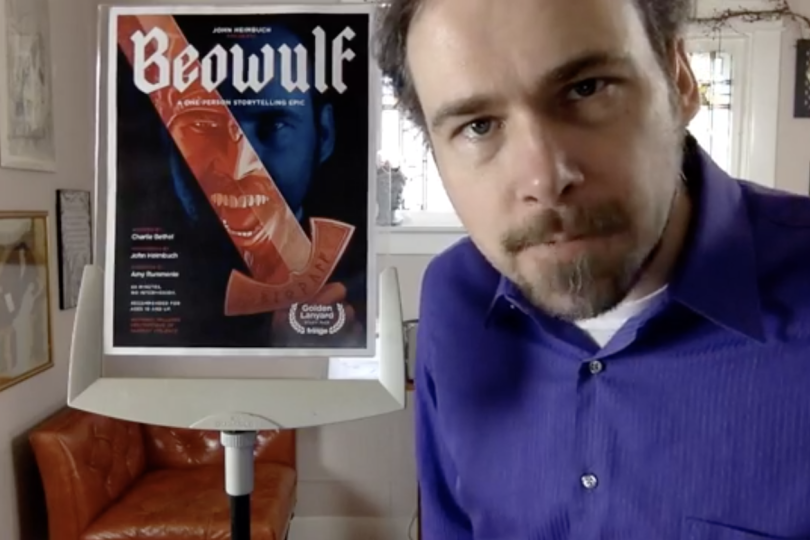Experimenting with the Virtual Epic

Three weeks into self-quarantine and I finally tuned in for my first virtual production: Beowulf. This one-man show, produced by Walking Shadow Theatre Company, was written by Charlie Bethel and performed by Co-Artistic Director John Heimbuch. As one of our oldest stories, Beowulf has been translated and adapted countless times. Even with this iterative background, this particular retelling via modern technology and social media was highly experimental.
This adventure tale is one of courage, victory, defeat, and the wisdom that can come with great power. With high energy, Heimbuch leads us into the world of the Geat warrior Beowulf as he comes to the aid of Hrothgar, king of the Danes, to take on the monster Grendel who has afflicted Hrothgar’s people. Beowulf defeats Grendel and then must also pursue Grendel’s mother, who seeks vengeance for the death of her son. In a cavalcade of “gore and glory,” Beowulf sinks through a lake of monsters to discover Grendel’s mother and destroy her in the depths of her cavern. He is rewarded by Hrothgar for these valiant conquests and, following his triumphs, Beowulf rises to the throne of the Geats. His last battle in life comes much later, when he faces a dragon and, ultimately, his death.
Heimbuch’s skilled performance as our storyteller was as vibrant as it could be through a screen. His shifts between narration and character dialogue provided a thorough image of the scenes, while his varied and full use of his body and hands served to beckon us into the room. The fluctuation in his volume and slight playful asides into a more modern narration at moments, compared to his customary epic style, kept 150 people engaged with this story from the comfort of their living rooms. While the scene and lighting was clearly makeshift, Heimbuch noted that this story was designed to be told anywhere. Live dramaturgy provided by Sarah Heller in the comments along the way provided thoughtful insights and helpful modern phraseology.
The challenge that comes with putting on a piece in this way is that much of the charm of theater lies in the exchange of energy between the performer and the audience. Without that live element, this performance lacked a certain warmth and that human bond that captivates. I could not stop considering the power this performance would have had if told in a large, darkened theater, an old pub late at night over pints of beer, or even around a roaring campfire on a summer’s evening; it is almost impossible to separate the oral storytelling tradition from these deeply interpersonal gatherings. Choosing to tell this story virtually feels like a brave choice to redefine how these gatherings can look in the modern age, and particularly at this moment when we cannot physically come together.
In these days, as we struggle to make do with the fact that we can no longer see how our world will look in the foreseeable future, Walking Shadow Theatre Company reminds us that by sharing stories, we are not alone. It was a comfort to hear our narrator recount “change comes, aye, even to rocks it comes.” The reminder that change will come can help us through this present moment and possibly even empower us to make the most of the time we have now; as Beowulf also says in his dying speech, “Life flashes and is gone: so get out there and do before your life is done.” In a time when little can be done outside of our homes, these lines ask us to reimagine how to “get out there and do” and reemphasize the importance of people like Heimbuch who are still finding creative ways to get their work “out there” despite no one going anywhere.
Check out Walking Shadow Theatre Company’s Facebook page on Saturday, April 4th at 8PM or Sunday, April 5th at 2PM to stream this live performance.


